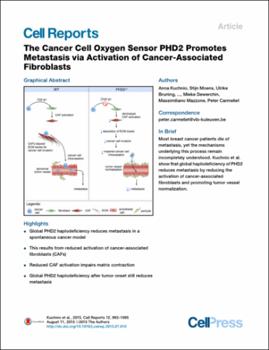The cancer cell oxygen sensor PHD2 promotes metastasis via activation of cancer-associated fibroblasts
Author
Hernández Fernaud, Juan Ramón ; Kuchnio, Anna; Moens, Stijn; Bruning, Ulrike; Kuchnio, Karol; Cruys, Bert; Thienpont, Bernard; Broux, Michaël; Ungureanu, Andreea Alexandra; Oliveira, Rodrigo Leite de; Bruyère, Françoise; Cuervo, Henar; Manderveld, Ann; Carton, An; Zanivan, Sara; Bartic, Carmen; Foidart, Jean-Michel; Noel, Agnes; Vinckier, Stefan; Lambrechts, Diether; Carmeliet, Peter
; Kuchnio, Anna; Moens, Stijn; Bruning, Ulrike; Kuchnio, Karol; Cruys, Bert; Thienpont, Bernard; Broux, Michaël; Ungureanu, Andreea Alexandra; Oliveira, Rodrigo Leite de; Bruyère, Françoise; Cuervo, Henar; Manderveld, Ann; Carton, An; Zanivan, Sara; Bartic, Carmen; Foidart, Jean-Michel; Noel, Agnes; Vinckier, Stefan; Lambrechts, Diether; Carmeliet, Peter
Date
2015Abstract
Several questions about the role of the oxygen sensor prolyl-hydroxylase 2 (PHD2) in cancer have not beenaddressed.First, the role of PHD2inmetastasis has not been studied in a spontaneous tumor model. Here, we show that global PHD2 haplodeficiency reduced metastasis without affecting tumor growth. Second, it is unknown whether PHD2 regulates cancer by affecting cancer-associated fibroblasts (CAFs). We show that PHD2 haplodeficiency reduced metastasis via two mechanisms: (1) by decreasing CAF activation, matrix production, and contraction byCAFs,aneffectthatsurprisingly relied on PHD2 deletion in cancer cells, but not in CAFs; and (2) by improving tumor vessel normalization. Third, the effect of concomitant PHD2 inhibition in malignant and stromal cells (mimicking PHD2 inhibitor treatment) is unknown. We show that global PHD2 haplodeficiency, induced not only before but also after tumor onset, impaired metastasis. These f indings warrant investigation of PHD2’s therapeutic potential.





